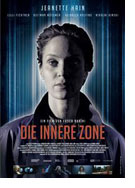

Opening 31 Jul 2014
Directed by:
Fosco Dubini
Writing credits:
Barbara Marx, Donatello Dubini, Fosco Dubini, Heike Fink
Principal actors:
Jeanette Hain, Lilli Fichtner, Dietmar Mössmer, Nikolai Kinski
The Inner Zone is based a true incident that happened on January 21, 1969. In a tunnel in the Swiss Alps is an atomic test reactor which had a core meltdown comparable to Tschernobyl or Fukishima. The tunnel was closed in time so that no radiation leaked out. It has been kept a secret from the public.
In 2023 the psychologist Marta is given an assignment to return to the location of a construction site of a tunnel. There has been an accident in which unknown gas has entered the air of the surrounding Valley resulting in low levels of oxygen. Marta should find the three remaining engineers and report on their symptoms of paranoia and confusion. Marta herself has taken part earlier in a biospheric project which has left her with hallucinations which she calls “echos”. She struggles to keep her “echos”, memories and wishes separate from one another. Marta finds one of the engineers and a strange young woman who has also stayed in the contaminated area. Searching for the other missing engineers, Marta enters into the mysterious space of the tunnel. The deeper she enters the tunnel, the deeper she also enters her own inner searching of what she has lost. The line between her “echos” and reality becomes blurred. She is searching for a lost son which she has only fleeting memories of.
The idea of The Inner Zone is to explore what happens when individual and collective memories and imagination enter the world of a damaged environment. It is filmed in the style of a science fiction culture of the 1960s where a trip to a foreign world leads to a trip through the inner self. Unfortunately, without a guide as to what is happening, the viewer of the movie is lost. Trying to piece together what is actually happening and what has or hasn't happened is extremely difficult. This film could be an interesting psychological film for a group to watch together and discuss. It is a good film for escaping but not for entertainment. I found the best part of the film is the opening in which a classical version of Metallica's “Nothing Else Matters” plays to stunning scenery of the Swiss Alps. (Alana Leichert)